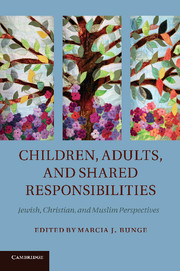Book contents
- Frontmatter
- Contents
- List of Contributors
- Acknowledgments
- Introduction
- PART I RELIGIOUS UNDERSTANDINGS OF CHILDREN
- PART II RESPONSIBILITIES OF CHILDREN AND ADULTS
- Chapter 9 Work, labor, and chores
- Chapter 10 Honor your father and your mother
- Chapter 11 Will I have Jewish grandchildren?
- Chapter 12 Linking past and present
- Chapter 13 Orphans and adoption
- Chapter 14 Second-hand children
- Chapter 15 Christianity's mixed contributions to children's rights
- Chapter 16 Children's rights in modern Islamic and international law
- Select bibliography
- Index of names
- Index of subjects
- References
Chapter 14 - Second-hand children
A Jewish ethics of foster care in an age of desire
from PART II - RESPONSIBILITIES OF CHILDREN AND ADULTS
Published online by Cambridge University Press: 05 October 2012
- Frontmatter
- Contents
- List of Contributors
- Acknowledgments
- Introduction
- PART I RELIGIOUS UNDERSTANDINGS OF CHILDREN
- PART II RESPONSIBILITIES OF CHILDREN AND ADULTS
- Chapter 9 Work, labor, and chores
- Chapter 10 Honor your father and your mother
- Chapter 11 Will I have Jewish grandchildren?
- Chapter 12 Linking past and present
- Chapter 13 Orphans and adoption
- Chapter 14 Second-hand children
- Chapter 15 Christianity's mixed contributions to children's rights
- Chapter 16 Children's rights in modern Islamic and international law
- Select bibliography
- Index of names
- Index of subjects
- References
Summary
Throughout all generations may we thankfully acknowledge You, and morning, noon and night recount Your praise for our lives that are entrusted to Your hand, our souls in Your care, Your many daily miracles, Your marvelous goodness, every moment.
From the traditional Amidah Prayer, Jewish Liturgy.In this chapter, our attention turns from children seen as infinitely precious by their families to children who live at the margins of our gaze. We will look closely at an issue that confronts anyone who seeks to understand the nature, goal, and meaning of religious responses to children: those abandoned and waiting in foster-care systems.
The problem of children in foster care is a global one. One can turn the corner in almost any city in the world and face the starkness of their need. Foster care – defined as the care for children who have been abandoned or taken away from their family by the state, who have not been adopted into a permanent home, and who typically live in this situation until the age of 18 – is largely paid for and regulated by states or federal governments, and, in some countries, administered by private charities or religious organizations. What is distinctive about foster care, as opposed to adoption, is that the care is a contractual negotiation, based on economic relationships with strangers and not on kinship bonds.
- Type
- Chapter
- Information
- Children, Adults, and Shared ResponsibilitiesJewish, Christian and Muslim Perspectives, pp. 256 - 271Publisher: Cambridge University PressPrint publication year: 2012
References
- 1
- Cited by



